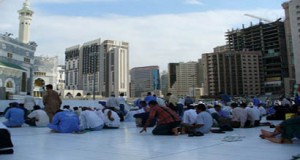Originally posted 2024-02-09 02:10:42.
Prayer is the first pillar of Islam that the Prophet (peace be upon him) mentioned after the declaration of the Testimony of Faith, by which one becomes a Muslim. It is a form of worship consisting of specific statements and actions. It begins by proclaiming the greatness of Allah (“Allahu Akbar”) and concludes with salutations (“As-salamu `alaykum wa rahmatullah”).
Prayer was the only command that Allah gave directly to His Messenger during the Night Journey. Allah says:
“Exalted is He who took His servant [i.e., Prophet Muhammad] by night from Al-Masjid Al-Haram to Al-Masjid Al-Aqsa, whose surroundings We have blessed, to show him of Our signs. Indeed, He is the Hearing, the Seeing.” (Al-Israa’ 17:1)
Prayer was also obligatory upon all the prophets (peace be upon them) and their nations. Furthermore, it was the first act of worship made obligatory by Allah upon every believer.
The Status and Virtue of Prayer
Prayer holds a lofty status in Islam—one that no other act of worship shares. It is the backbone of the religion, without which the religion cannot be properly established. The Prophet (peace be upon him) said:
“The head of the matter is Islam, its backbone is the prayer, and its highest pinnacle is jihad in the cause of Allah.” (Muslim)
In the Qur’an, Allah repeatedly commands believers to establish prayer. He says:
“Indeed, prayer has been decreed upon the believers a decree of specified times.” (An-Nisaa’ 4:103)
“Establish the prayer and give zakah, and bow with those who bow [in worship].” (Al-Baqarah 2:43)
The Prophet (peace be upon him) said:
“Islam is built upon five pillars: bearing witness that none is worthy of worship but Allah and that Muhammad is His Messenger; establishing the prayer; paying zakah; fasting during Ramadan; and performing Hajj.” (Al-Bukhari and Muslim)
The significance of prayer is so profound that one is obligated to observe it in all circumstances—whether traveling or staying at home, in safety or fear. Allah says:
“Be guardians of your prayers and of the middle prayer, and stand before Allah with devotion. If you fear [an enemy], then [pray] on foot or while riding. But when you are secure, remember Allah as He has taught you what you did not know.” (Al-Baqarah 2:238–239)
Moreover, it is the first deed for which a person will be held accountable on the Day of Judgment. The Prophet (peace be upon him) said:
“The first act that the slave will be held accountable for on the Day of Judgment will be the prayer. If it is sound, then the rest of his deeds will be sound. But if it is corrupt, then the rest of his deeds will be corrupt.” (At-Tabarani)
Prayer is the noblest of deeds. It is the link between the believer and his Lord. Through prayer, the believer communicates with Allah five times daily. To emphasize its virtue, the Prophet (peace be upon him) said:
“When the time for a prescribed prayer comes, and a Muslim performs ablution properly, prays with humility and bowing, it will be an expiation for his past sins, as long as he does not commit a major sin. This is applicable at all times.” (Muslim)
The Prophet also gave a beautiful analogy for the regular observance of prayer:
“The five daily prayers are like a deep river flowing by the door of one of you, in which he bathes five times a day.” (Muslim)
Prayer was the final advice of the Prophet (peace be upon him) before he passed away. He said:
“Guard your prayer, guard your prayer, and fear Allah regarding those under your care (i.e., slaves).” (Ahmad)
The Impact of Prayer
Prayer strengthens the relationship between the servant and Allah. If one’s prayer is sound and sincere, the rest of their deeds will also be sound. If the prayer is lacking, so will be the rest of one’s actions.
The spirit of prayer is sincerity, devotion, and reflection. It strengthens faith, purifies the soul, and prepares the believer for success in this life and the Hereafter. It helps the individual stay away from immorality and evil. Allah says:
“Recite [O Muhammad] what has been revealed to you of the Book and establish the prayer. Indeed, prayer prohibits immorality and wrongdoing, and the remembrance of Allah is greater. And Allah knows what you do.” (Al-‘Ankabut 29:45)
Prayer is meant to generate inner spiritual power, strengthen faith, and create awareness of Allah. This enables the believer to resist temptations, endure trials, and remain steadfast. The Prophet (peace be upon him) would turn to prayer in times of distress and say to Bilal:
“O Bilal, comfort us with it [i.e., by calling the Iqamah for prayer].” (Ahmad)
The Qur’an describes the impact of prayer on the human soul:
“Indeed, mankind was created anxious. When evil touches him, he is impatient; and when good touches him, he withholds it—except those who observe prayer—those who are constant in their prayer.” (Al-Ma‘arij 70:19–23)
_______________________
Source: www.islamweb.net.
 Arabic
Arabic English
English


